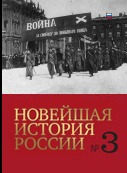The Mobilization of the American Doughboy (and Beyond): One Case Study of the Long Great War
The Mobilization of the American Doughboy (and Beyond): One Case Study of the Long Great War
Author(s): D. J. Kotlowski Subject(s): History
Published by: Издательство Исторического факультета СПбГУ
Keywords: Paul V. McNutt; Ninety-Day Wonder; Commission on Training Camp Activities; American Legion; Cold War Liberalism
Summary/Abstract: The United States was a late-comer to the Great War. Most Americans were reluctant to marshal their human and industrial resources for battle until the Congress declared war on Germany in 1917. Thereafter, the country mobilized as men entered military service, received education about venereal disease, and went to distant battlefields. Much of these changes can be seen in the life of Paul V. McNutt, a university professor who became an officer after three months of training. During the war, McNutt drilled soldiers and spoke on behalf of sexual cleanliness. But he never saw combat. Such a record did not prevent him from joining the American Legion (the principal veterans organization to emerge following World War I), rising through its ranks to become national commander, and then using the Legion to launch a political career. He became a state governor and a high-ranking official in the administration of Franklin D. Roosevelt. Not surprisingly, McNutt peppered his speeches with military-style metaphors. McNutt’s experience exemplifies what might be called “the long Great War.” As a soldier and a practitioner of veteran’s politics, he acquired the major elements of his political philosophy which rested on concept of “security,” an idea that became central to American politics during the 1930s and 1940s. Along with the American Legion, McNutt came to believe in patriotic service, military preparedness, federal provisioning for veterans, anti-Communism, and a realistic foreign policy which, when combined with his championing of the welfare state during the 1930s, would have made him the quintessential, security-conscious Cold War liberal by the late 1940s. Alas, by that point, his political career was over.
Journal: Новейшая история России
- Issue Year: 4/2014
- Issue No: 11
- Page Range: 86-99
- Page Count: 14
- Language: English

